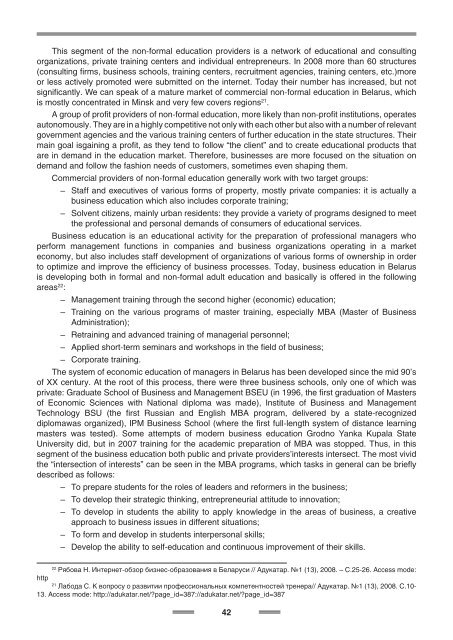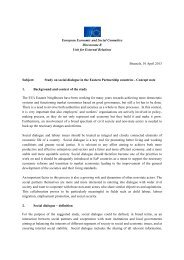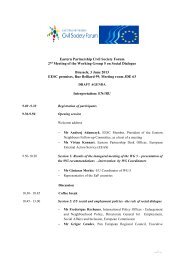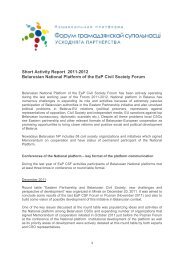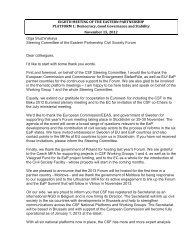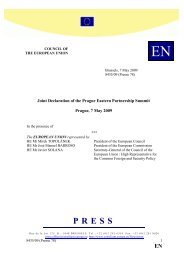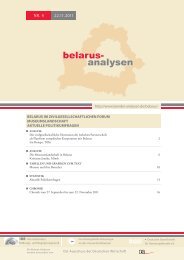Non-formal education - Eastern Partnership Civil Society Forum
Non-formal education - Eastern Partnership Civil Society Forum
Non-formal education - Eastern Partnership Civil Society Forum
Create successful ePaper yourself
Turn your PDF publications into a flip-book with our unique Google optimized e-Paper software.
This segment of the non-<strong>formal</strong> <strong>education</strong> providers is a network of <strong>education</strong>al and consulting<br />
organizations, private training centers and individual entrepreneurs. In 2008 more than 60 structures<br />
(consulting firms, business schools, training centers, recruitment agencies, training centers, etc.)more<br />
or less actively promoted were submitted on the internet. Today their number has increased, but not<br />
significantly. We can speak of a mature market of commercial non-<strong>formal</strong> <strong>education</strong> in Belarus, which<br />
is mostly concentrated in Minsk and very few covers regions 21 .<br />
A group of profit providers of non-<strong>formal</strong> <strong>education</strong>, more likely than non-profit institutions, operates<br />
autonomously. They are in a highly competitive not only with each other but also with a number of relevant<br />
government agencies and the various training centers of further <strong>education</strong> in the state structures. Their<br />
main goal isgaining a profit, as they tend to follow “the client” and to create <strong>education</strong>al products that<br />
are in demand in the <strong>education</strong> market. Therefore, businesses are more focused on the situation on<br />
demand and follow the fashion needs of customers, sometimes even shaping them.<br />
Commercial providers of non-<strong>formal</strong> <strong>education</strong> generally work with two target groups:<br />
– Staff and executives of various forms of property, mostly private companies: it is actually a<br />
business <strong>education</strong> which also includes corporate training;<br />
– Solvent citizens, mainly urban residents: they provide a variety of programs designed to meet<br />
the professional and personal demands of consumers of <strong>education</strong>al services.<br />
Business <strong>education</strong> is an <strong>education</strong>al activity for the preparation of professional managers who<br />
perform management functions in companies and business organizations operating in a market<br />
economy, but also includes staff development of organizations of various forms of ownership in order<br />
to optimize and improve the efficiency of business processes. Today, business <strong>education</strong> in Belarus<br />
is developing both in <strong>formal</strong> and non-<strong>formal</strong> adult <strong>education</strong> and basically is offered in the following<br />
areas 22 :<br />
– Management training through the second higher (economic) <strong>education</strong>;<br />
– Training on the various programs of master training, especially MBA (Master of Business<br />
Administration);<br />
– Retraining and advanced training of managerial personnel;<br />
– Applied short-term seminars and workshops in the field of business;<br />
– Corporate training.<br />
The system of economic <strong>education</strong> of managers in Belarus has been developed since the mid 90’s<br />
of XX century. At the root of this process, there were three business schools, only one of which was<br />
private: Graduate School of Business and Management BSEU (in 1996, the first graduation of Masters<br />
of Economic Sciences with National diploma was made), Institute of Business and Management<br />
Technology BSU (the first Russian and English MBA program, delivered by a state-recognized<br />
diplomawas organized), IPM Business School (where the first full-length system of distance learning<br />
masters was tested). Some attempts of modern business <strong>education</strong> Grodno Yanka Kupala State<br />
University did, but in 2007 training for the academic preparation of MBA was stopped. Thus, in this<br />
segment of the business <strong>education</strong> both public and private providers’interests intersect. The most vivid<br />
the “intersection of interests” can be seen in the MBA programs, which tasks in general can be briefly<br />
described as follows:<br />
– To prepare students for the roles of leaders and reformers in the business;<br />
– To develop their strategic thinking, entrepreneurial attitude to innovation;<br />
– To develop in students the ability to apply knowledge in the areas of business, a creative<br />
approach to business issues in different situations;<br />
– To form and develop in students interpersonal skills;<br />
– Develop the ability to self-<strong>education</strong> and continuous improvement of their skills.<br />
22<br />
Рябова Н. Интернет-обзор бизнес-образования в Беларуси // Адукатар. №1 (13), 2008. – С.25-26. Access mode:<br />
http<br />
21<br />
Лабода С. К вопросу о развитии профессиональных компетентностей тренера// Адукатар. №1 (13), 2008. С.10-<br />
13. Access mode: http://adukatar.net/?page_id=387://adukatar.net/?page_id=387<br />
42


